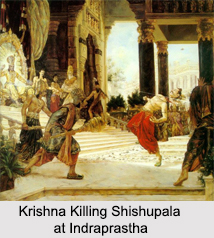 Shishupala Vadha is a Sanskrit poem that consists of twenty cantos. It is also known as "Magha Kavya". The theme of the poem has been borrowed from Mahabharata. It is a simple epic tale. Lord Krishna encouraged Yudhisthir to perform his royal dedication. The rite continued and as per Bhishma`s advice Krishna got the award. Shishupala, king of Chedi became angry and left the hall. Yudhisthir followed and tried to appease him.
Shishupala Vadha is a Sanskrit poem that consists of twenty cantos. It is also known as "Magha Kavya". The theme of the poem has been borrowed from Mahabharata. It is a simple epic tale. Lord Krishna encouraged Yudhisthir to perform his royal dedication. The rite continued and as per Bhishma`s advice Krishna got the award. Shishupala, king of Chedi became angry and left the hall. Yudhisthir followed and tried to appease him.
Plot of Shishupala Vadha
The plot of Shishupala Vadha is drawn from one of the epic, Mahabharata. In the original story, after insulting Lord Krishna numerous times in an assembly, Shishupala, son of Damaghosha and the king of Chedis in central India, finally enraged him and had his head struck off.
Earlier, Shishupala had clashed with Krishna many times. When the story began, Sage Narada repeated though Krishna had killed "Hiranyakashipu" earlier, the demon had been reborn as Shishupala and desired to overpower the world. Yudhisthir and his brothers had conquered the four directions and killed Jarasandha. In the meantime, Yudhisthir wished to perform the Rajasuya yagna and invited Krishna. Krishna took the advice of his brother Balarama and Uddhava. According to Balarama"s advice Krishna declared war against Shishupala right away. Uddhava pointed out that this would involve several kings and put out of place Yudhishthir"s yagna. He suggested to ensure that Shishupala attend the yagna as well as an alternative. Krishna was pleased with this plan and set out with his army to Indraprastha where the yagna would be held.
On the way, he saw Mount "Raivataka" and decided to take shelter there. The seasons combine together for his happiness. The army resumed its march in Canto XII, and Krishna at last entered the city. The yagna took place, and at the end, on Bhishma`s counsel, the highest honour (arghya) is presented to Krishna. Shishupala was angry at this and made a long speech on the bad qualities of Krishna and left the assembly. Then he sent a messenger to Krishna. Krishna declared war and the armies fought, with a variety of complex formations of the armies. In the end, Krishna entered the fight and after a long clash, stroke off Shishupala`s head with Sudarshana Chakra, his discus.
Linguistic Skill of Shishupala Vadha
Shishupala Vadha has a rich language. While unfolding the march of an army, cantos 9 to 11 take a deviation to explain nature, sunrise and sunset, the seasons and so on. Shishupala Vadha is an imperative source on the history of Indian ornaments and costumes. Magha, the Sanskrit poet is also well-known for the method of developing the theme. The work is primarily in the veera rasa (heroic mood). His similes are also extremely original, and many verses from the works are of self-governing interest, and are quoted for their poetic or ethical nature.













